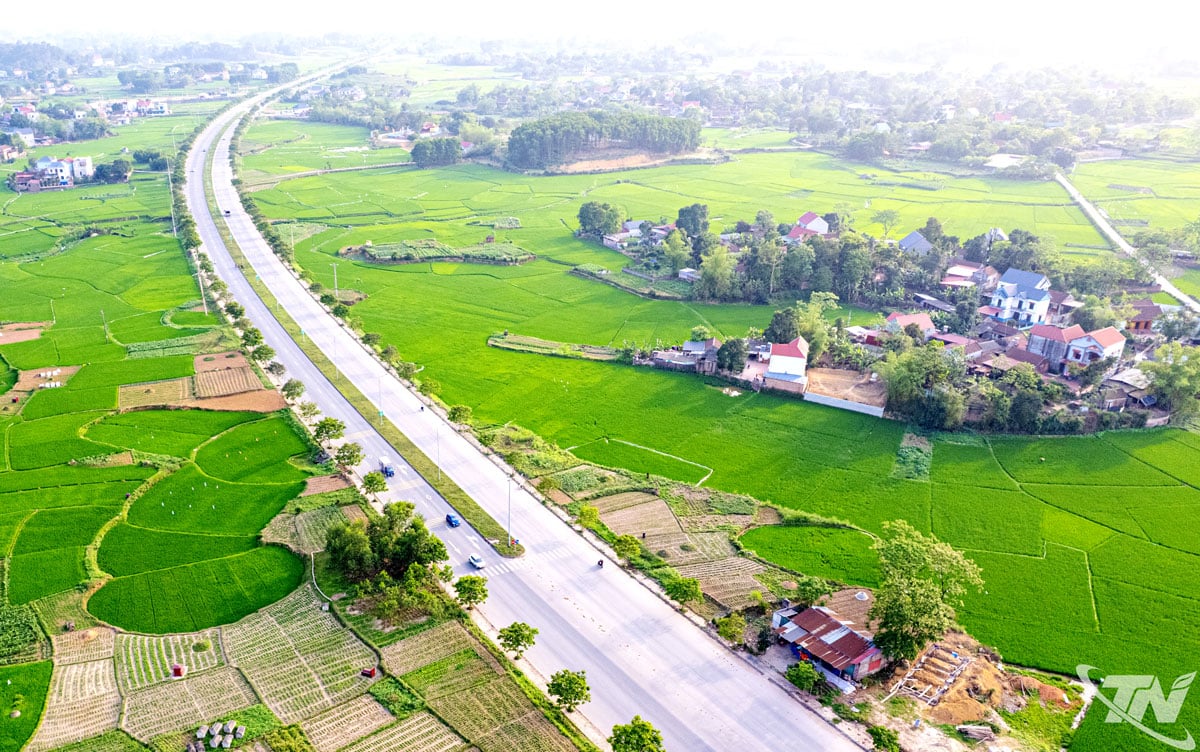 |
| Mobilizing and integrating various investment resources plays a crucial role in the effective implementation of the Program. |
Rural areas are becoming increasingly prosperous.
After more than 15 years of implementing the National Target Program for New Rural Development, Thai Nguyen province has achieved many comprehensive results. The total resources mobilized for the program in the 2021-2025 period across the province reached over 85,000 billion VND. Of this, capital mobilized from voluntary contributions from people and the community, including in-kind contributions and labor converted into monetary value, amounted to nearly 1,300 billion VND. To date, the province has established more than 1,000 cooperatives and developed nearly 180 craft villages.
The above results have contributed to fundamentally changing the face of rural areas and significantly improving the material and spiritual lives of the people.
However, in reality, many difficulties and limitations still exist, such as the unsustainable achievement of quality standards in some localities, the large development gap between regions, and the continued heavy reliance on state support in some areas.
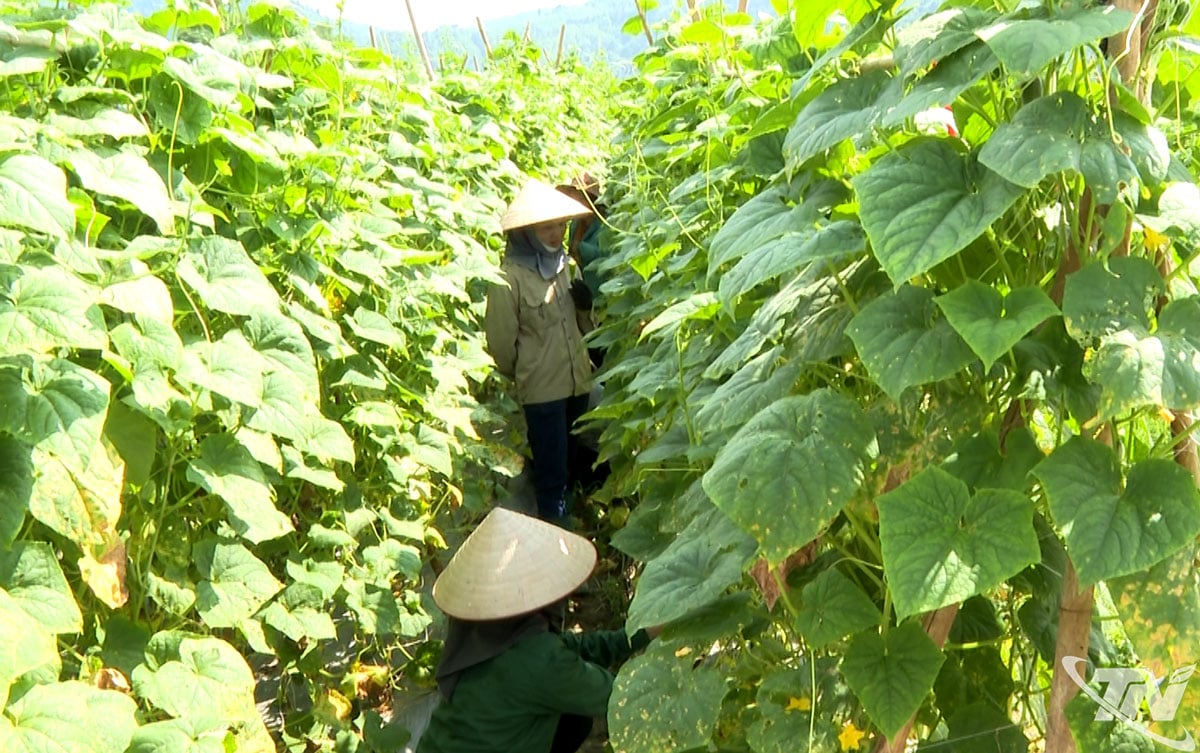 |
| The cucumber farming model in Phiêng Kham village (Cẩm Giàng commune) has brought quite high economic efficiency to households belonging to a group of farmers with similar interests. |
According to a review conducted after the merger of administrative units, 42 out of 77 communes in the province have now met the standards for New Rural Development, significantly improving the appearance of many rural areas. However, with 35 communes still not having reached the New Rural Development target, a more decisive approach to inspection and supervision, combined with specific and practical solutions, is required to accelerate progress and achieve the set goals sooner.
The obstacles are not easy to overcome.
Among the 35 communes that have not yet achieved the New Rural Area (NRA) status (mainly concentrated in the northern communes of the province), Ba Be is one of the localities facing many difficulties, having only met 5 out of 19 criteria to date. The commune has 33 villages, of which 18 are located in mountainous areas with limited economic conditions. The criterion regarding schools is a major challenge, as all 8 schools in the area have not yet met the standards; most schools currently face dilapidated and inconsistent facilities, failing to meet the increasingly high demands of teaching and learning.
Ms. Hoang Thi Nhung, Principal of Nam Mau Primary and Secondary School (Ba Be commune), said: "The school currently lacks many facilities. The building area is limited while there are many school locations scattered across villages and hamlets. Most classrooms at these locations have new teaching and learning conditions that only meet the minimum learning needs of children from ethnic minority communities in the highlands. We hope to receive attention and investment from higher authorities so that the children can have a safer, more solid, and more spacious learning environment."
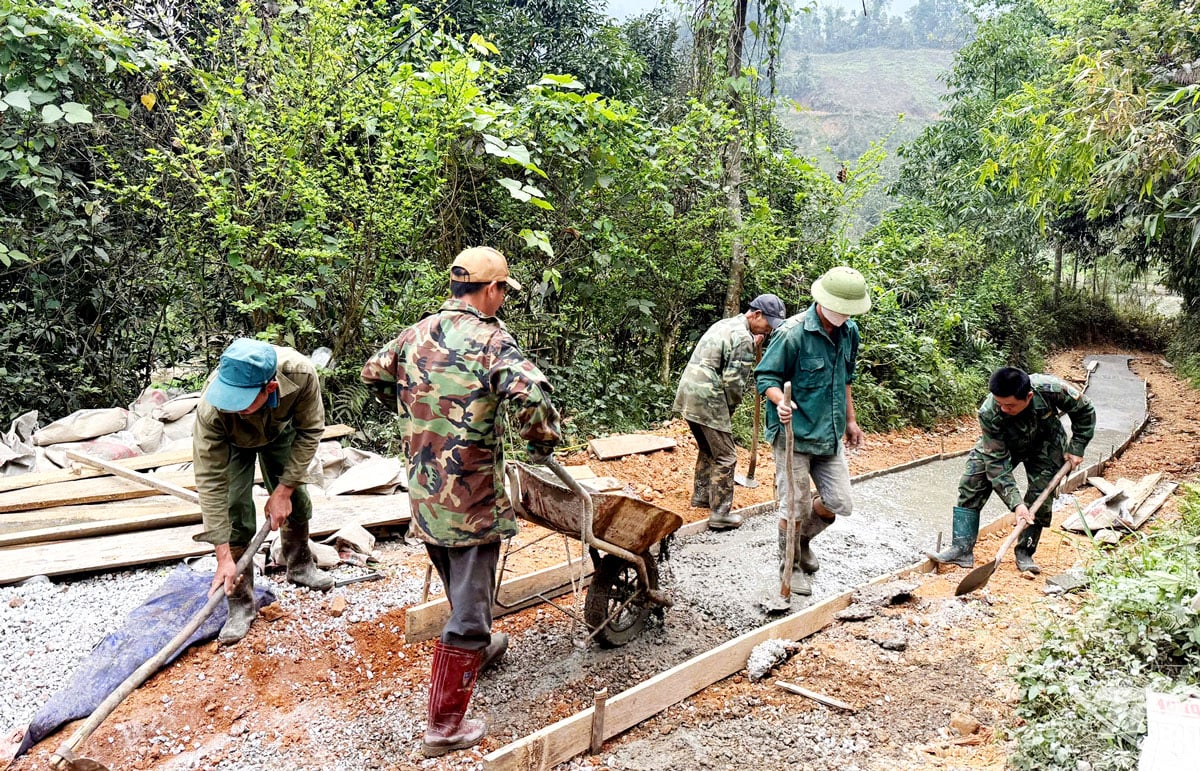 |
| Locals participate in building concrete roads for residents in Phong Quang commune. |
To accelerate progress towards achieving the New Rural Area (NRA) goals, the Department of Agriculture and Environment has coordinated and organized delegations to visit and assess the actual situation in 35 communes on the NRA development roadmap.
Mr. Nguyen My Hai, Deputy Director of the Department of Agriculture and Environment, provided further information on the practical difficulties in the localities after the survey: The communes that have not yet completed the criteria for New Rural Development are mainly those in particularly difficult areas, located in mountainous regions with heavily fragmented terrain.
Socio-economic infrastructure still has many limitations, such as rural roads that are degraded and do not meet standards in many places; school facilities, health stations, and cultural centers are not synchronized and lack equipment; irrigation systems, clean water sources, and electricity for daily life have not been fully invested in, especially in remote villages.
In particular, the northern communes of the province have a very high poverty rate; if considered according to the multidimensional poverty standard, the average poverty rate in most localities is over 60%, which makes it difficult to achieve the New Rural Area status in the near future.
To achieve the goal of bringing communes up to the New Rural Area standard in the coming period, all levels and sectors will strengthen inspection and supervision at the grassroots level; at the same time, clearly assign responsibilities to each unit in charge of criteria in each commune. The Department of Agriculture and Environment will advise the Provincial People's Committee to establish a New Rural Area Coordination Office to support the direction, monitoring, inspection and guidance of departments and sectors in implementing criteria within their scope of management.
 |
| Many criteria for New Rural Development in the communes require significant effort to achieve. |
Consensus to achieve a breakthrough.
To ensure that communes achieve their New Rural Development goals early, it is first necessary to focus on implementing each specific criterion with a suitable roadmap and steps. For criteria that are still lacking, the assigned departments and units must closely monitor the situation at the grassroots level and conduct on-site inspections to develop targeted support plans. The main difficulties currently focus on transportation infrastructure, schools, cultural facilities, and environmental sanitation.
Furthermore, the need for capital support, technology transfer, and vocational training for rural laborers is also extremely urgent. Therefore, the proposed solution is to strengthen inspection and monitoring of progress; at the same time, maximize resource mobilization, integrate programs and projects, and encourage people's participation, thereby ensuring progress while improving the quality of New Rural Area criteria.
Mr. Nguyen Thanh Nam, Head of the Department of Cooperative Economics and Rural Development of Thai Nguyen province, said: Along with guidance and supervision from the province, communes need to develop detailed plans to implement each missing criterion, clearly defining the content, time, resources, and responsible unit.
Based on this, localities need to boldly propose specific support needs such as investment in essential infrastructure, funding for upgrading schools and cultural facilities, environmental treatment systems, as well as technical support and loans for production development. Proactive planning, coupled with realistic recommendations, not only helps all levels and sectors accurately grasp the situation but also facilitates the allocation of resources in the right areas, contributing to the early achievement of the New Rural Area goals in the communes.
Continuing to identify the construction of new rural areas as a central, regular, and long-term task of the entire political system, this is a continuous process with a starting point but no end point. The program must be implemented in a comprehensive and sustainable manner, linked to restructuring the agricultural sector, developing the rural economy, protecting the environment, preserving national cultural identity, and improving the quality of life for the people, with the people as the subject and center of the process.
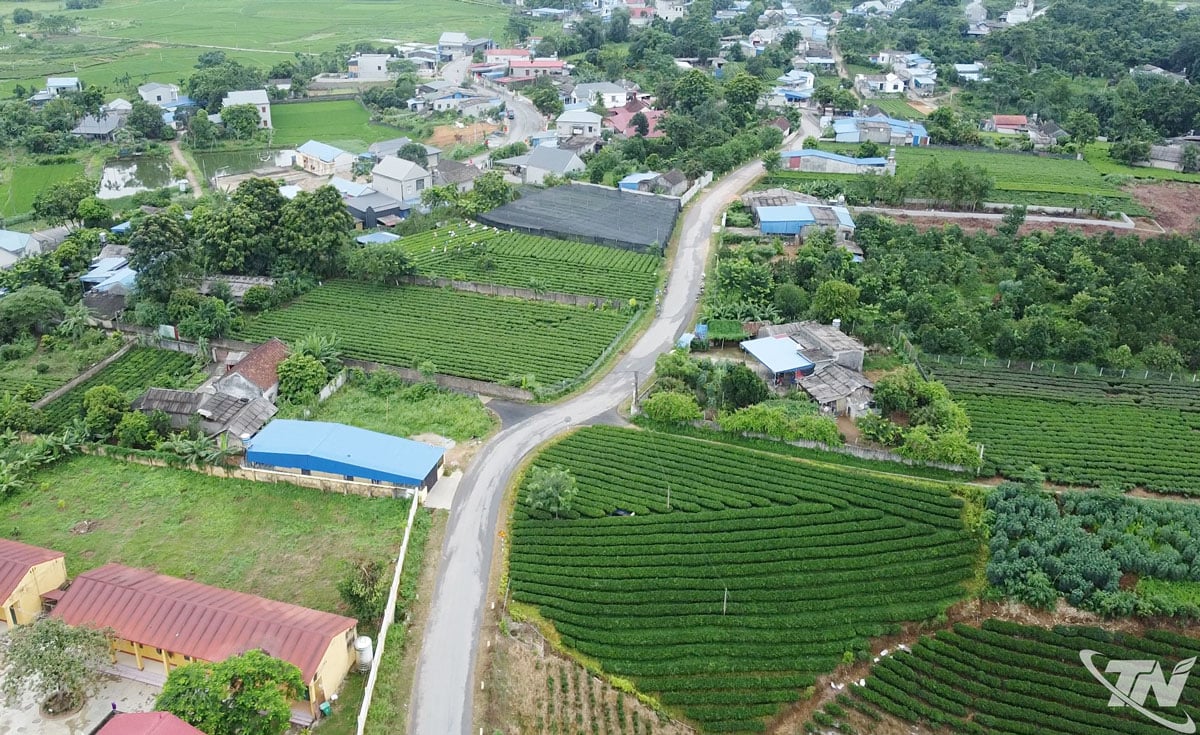 |
| A view of La Bang commune today. |
The focus of the Program is to guide people in developing appropriate economic models, actively applying high-tech science and technology, and linking production along the value chain with support for product consumption.
Local authorities are paying special attention to developing OCOP products, strengthening regional production linkages, and connecting OCOP products with inter-regional agricultural ecosystems. The goal is to promote agricultural and rural development, create jobs, and increase income for the people.
During the implementation of the Program, localities continue to promote the autonomy, self-governance, and creativity of the local community, ensuring clear decentralization and delegation of power, and encouraging initiative and creativity. The central and provincial governments play a guiding role, issuing mechanisms, policies, and providing targeted support, closely linking the construction of new rural areas with the urbanization process and the development of modern and civilized rural areas, contributing to narrowing the development gap between regions.
Reaching the finish line of the New Rural Development program is not just about fulfilling a few criteria on paper, but fundamentally about improving the quality of life for the people in a substantive and sustainable way. This requires localities to avoid chasing achievements, to identify the right priorities, to be closely aligned with actual needs, and to implement projects thoroughly and effectively.
With strong political determination, public consensus, and appropriate solutions, the goal of bringing communes to the finish line of the New Rural Development program is entirely achievable, contributing to a breakthrough in socio-economic development in rural areas.
Thai Nguyen province aims to have 100% of its communes meet the standards for New Rural Development by 2030, with at least 50% meeting the standards for advanced New Rural Development and 10% or more meeting the standards for modern New Rural Development. To achieve this goal on schedule, a decisive and coordinated effort from the entire political system is needed; localities must proactively mobilize and effectively utilize resources, prioritizing criteria that are still weak, such as schools, the environment, and income. Promoting social mobilization in the fields of education, health, and culture is also a feasible approach, both reducing budgetary pressure and increasing community participation in the New Rural Development process. |
Source: https://baothainguyen.vn/kinh-te/202509/don-lucve-dich-nong-thon-moi-fe96f1d/














































































































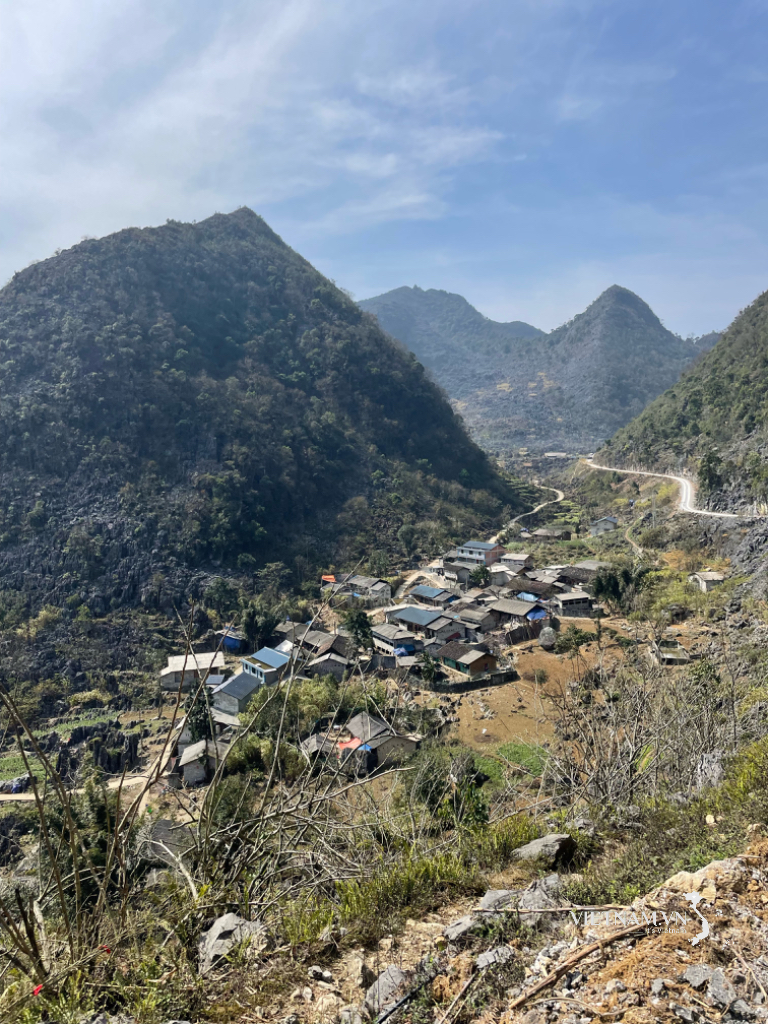


Comment (0)